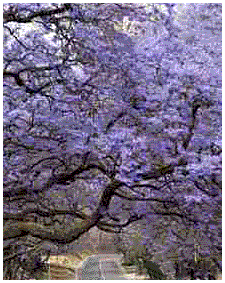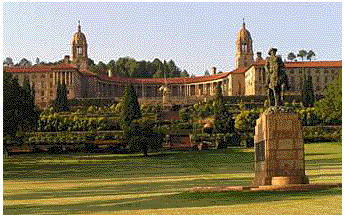Jakob has his Day in Court
Our flat cleaner, Jakob, stood in the witness box, scrubbed so clean he gleamed. He wore his best suit, of metallic grey. It was also his only one. Around his neck, impeccably knotted, was a blue-and-pink-striped tie. He had used a Windsor knot, the same one he had taught his little baasje (little boss), that being me. Although I was only twelve when he imparted to me the indispensable skill of tying the half Windsor and the Windsor, I was white, or rather White, and in Apartheid South Africa that made me the boss over this grown man.

Standing trial on charges of murder, man-slaughter, assault and battery, and defeating the ends of justice, was police sergeant Ric Barker (White, male, the docket stated). Contrary to what the name indicates, he was not English-speaking, but Afrikaans-speaking. He was one of Apartheid’s dogs-of-war. That he was standing trial at all bore testimony to just how far he had overstepped the mark. His reign of terror in Sunnyside, Pretoria, where our block of flats stood, had lasted for years and had become an embarrassment for even that brutal regime. Knowing he could get away with murder - literally - he had become slovenly and scarcely bothered any more applying a veneer of legitimacy to his actions.
“You say he punched you in the face?” questioned the prosecutor.
“Yes baas,” replied Jakob deferentially.
“Hard?”
“Yes baas, hard.”
“How hard?”
“Very hard.”
“Can you show the court how he hit you?”
Jakob stood immobile. He did not comprehend what was expected of him.
“Come on, man. Go through the motions, throw a punch. Do it exactly like you say the accused did it.”
Still Jakob stood immobile. Erect and dignified, gleaming in his shiny metallic grey suit, but immobile.
“Dom kaffir,” muttered the court sergeant, eliciting a derisive snigger from those closest to him. He was not reprimanded, because judges tended to be hard of hearing at just such moments. Jakob, with 300 years’ conditioning, did not react to being called a stupid aborigine. Not so’s a white person would notice. But other blacks in the (segregated) public gallery would have felt the slight stiffening of his body.
”I would have biffed him right into the middle of next week,” exclaimed Maqina.
Later, much later, when the headlines had faded somewhat, Jakob had let on - not in so many words, but with a nudge and a wink - that with the delivery of that insult the germ of an idea had popped into his head. That germ had revenge written into its DNA.
To understand where it had come from, I will sketch a little of the sinister climate in the not-so-sunny Sunnyside during Sergeant Ric Barker’s reign of terror. This was the time of the “Pangaman Murders”, brutal, bloody butcherings of white people parked in lonely spots on the fringes of Barker’s territory.
The murders came fast and furious; the media screamed for effective action. Ric Barker saw himself leading the cavalry as it rode to the rescue - cost what may. And cost it certainly did: a few badly battered suspects, and a couple of dead ones too. Trouble was, soon after each arrest, with the latest suspect licking his wounds behind lock and key, or safely buried, another Pangaman murder would be committed. Oh bother.
Pretoria, seat of the Government and home to a profusion of lilac-flowering Jakaranda trees, was never as violent a city as the Johannesburg I was to report on in the early sixties when working as crime reporter on a morning newspaper in the City of Gold. We put New York in the shade, averaging thirteen murders per weekend then. But in the early fifties Pretoria certainly gave Jo’burg a run for its money.

Apart from their Pangaman investigations, the police in Sunnyside - as everywhere else - made sporadic “pass control” raids, arresting any black person not carrying on his person the necessary documents permitting him to be where he was, when he was. You never knew when Barker and his henchmen would strike. At times the Black Maria - a police van with a lock-up cage at the back - would ghost silently to a halt behind the cramped living quarters for cleaners that every block of flats had in the basement. At other times they would arrive with a screech of tyres and a flurry of movement, impervious to remarks of “shame, shame on you” coming from me and my Dutch friend Annie. She knew about injustice. Her mother had been in the resistance in Holland during the war. We were so brave, protected by our tender ages.
It was not only the police who terrorised the black people. Woe to them if they did not step off the pavement to allow whites to pass; and failing to avert their gaze was provocation enough to warrant a fist in the face. I stood aghast one day watching a young white man running across the roofs of cars in a traffic jam, in pursuit of a fleeing black vendor who had accidentally driven his ice-cream tricycle into the man's car. When he caught him, he knocked him senseless. And no one bothered to intervene. His victim, because he was black, was presumed guilty.
The weirdest, weirdest thing was, the blacks were a lot jollier than the whites. They sang, they danced, they joked. You could plug it here and plug it there, but their joie de vivre kept bubbling to the surface. That, to me, was real courage.
Why, just the other day, it seems, I was standing at the check-out of our small, local supermarket. Now the worst thing you could ask a teenage boy to do - apart from buying tampons, that is - was to bring home a jumbo pack of toilet paper. I mean, then everyone knows what you do.
And just my luck that the young black packer at the far end of the check-out could read exactly what fears plagued me. Without a word he placed my groceries one by one in a large carry-bag. Only one item could not fit in-
“I know! The super-duper pooper-scooper,” cried Maqina with glee.
So he jovially thrust the large pack into my arms and wished me: “Lekker kak die naweek, baasje.”
“Happy shitting this weekend, little boss,” interpreted Gall, slapping his thighs in merriment.
I certainly cringed in embarrassment, yet my suffering paled by comparison to what he would have had to endure had I reported him. At the least he would have lost his job, but a beating could not have been ruled out. Hours later, when finally the blush had left my face, I had to admire his daring.
Before the first Pangaman murder, Barker had had to content himself mostly with venting his anger on suspected pass offenders - meaning any black person. Jakob had often been at the receiving end, and though his person was not always harmed, his dignity certainly was. Powerless, Annie and I would turn away as the police knocked the cleaners about.
Then the Pangaman struck, to everyone’s horror, and Barker’s elation. Eager to impress, he acted rashly by making a quick arrest on the flimsiest of evidence. Not that this bothered him. He knew you could beat a confession out of even the most stubborn hotnot. And if beating did not loosen the tongue, electrodes to the genitals certainly did. Dead suspects had “died while being restrained as they attempted escape”.
Yet when one after the other obliging blacks confessed to being the lone Pangaman, even the Minister of Police must have squirmed on his seat of power in the Union Buildings up there on the hill.

Still, it took unconscionably long before the powers-that-be indicted Barker. Although the English-language press were usually brushed aside by the Apartheid rulers, their sustained campaign bore fruit this time. Barker was arraigned on a long list of charges, and Jakob had been summoned to testify against him about his arrest proceedure.
The prosecutor spoke loudly and slowly, the way one addresses the mentally retarded.
“You must show the baas there,” he pointed to the judge, “how the accused hit you.”
Jakob scratched his head and looked so retarded you wondered how he had ever managed to tie a Windsor knot. The prosecutor was exasperated. He walked across to the witness stand, beckoning the sneering court sergeant to join him.
“Now look, Jakob. Come stand here in front of the sergeant. Pretend he’s you, and you are the accused, Sergeant Barker. Now demonstrate to the court how he hit you,” and he threw a limp arm at the sergeant’s head.
Jakob appeared to wrestle with the white man’s words. The court sergeant made little circles at his temple with one finger, playing to the gallery. The prosecutor, though, was immensely patient with the witness, as indeed one needed to be with blacks. At last the penny appeared to drop: Jakob squared up before the sergeant.
He did not look very strong. Eyes averted, shoulders dropped, this submissive stance of black men in the company of white men was a self-preservation tactic. But I had seen Jakob stripped to the waist, scrubbing himself under a cold-water faucet behind the fire-escape of our flats. He was built like a buffalo.
As he took up his position he gave the impression of fumbling, but his feet were precisely placed beneath his shoulders, the left one forward. Shaking his head at the mysterious ways of the white man, he put his right arm way back behind him, then looked questioningly at the judge.
“Yes, yes,” the man nodded from on high. “Get on with it.”
Jakob had waited 300 years for this, but not in his wildest dreams had he ever expected to have the approval of not only the state prosecutor, but the judge too! His eyes were averted throughout, but his peripheral vision was 20-20. As his arm came round he kept it loose, flailing almost, so as to give no warning of what was coming. Only in the last few centimetres did the muscles taughten and a buffalo shoulder move in behind the arm. His fist - and a whole nation's wrath - exploded in the sergeant’s face and sent him toppling like a felled tree.
It was a good few minutes before the registrar managed to revive him by sprinkling cold water from a glass.
“Auw auw auw,” exclaimed Jakob, managing to look more surprised than anyone at what he had done.
Inside of him, where only black people could see, it was all sunshine.
P.S. - Barker was subsequently acquitted on all charges except that of defeating the ends of justice. The judge did have the decorum, though, to impose as heavy a sentence as was permitted by law. I forget what it was, something like six years' imprisonment. He was also dishonourably discharged from the police force. And the Pangaman? He was caught by some other policeman eventually. When the murders bearing his hallmark stopped, we knew they had gotten the right man this time.